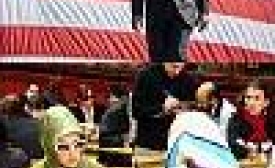united states
The Brookings Institution's report on its proposed USA-World Trust has unleashed a predictable torrent of criticism from the public diplomacy community. To be sure, not all of the commentary has been negative, but much of it has been. The critics are rehashing many of the same tired arguments that have been used to kill any ideas to deal with today's public diplomacy realities.
I am happy to see that Alvin Snyder is contributing again to the CPD Blog. I have always learned from his experience and have found his views to be interesting and provocative. His return commentary, about a revival of Worldnet, accordingly provoked me to add some thoughts about the possibilities for a public diplomacy television service.

This study examined content from online newspapers and blogs from across the Arab world to assess the developing media discussion of the United States presidential election and results.
If we consider public diplomacy in the narrower sense, as one government's efforts to speak to the public of another nation, President Bush's visit to Iraq this weekend would be a, well, "fitting" symbol of the state of American PD. He narrowly ducked rage that was aimed at him by a new manner of shoe bomber, one equipped with both ninja skill and ferocity.
With help from USC’s Center on Public Diplomacy and hundreds of other individuals and groups, I recently authored a Brookings Institution report on public diplomacy and what it should look like in the coming years and decades. That report is available on-line at Voices of America: U.S.
Much that is written about public diplomacy focuses on Europe and the Muslim world. National news media in the US, headquartered in New York and Washington, equates foreign opinion with approving editorials in The Guardian and large crowds in Berlin. By those criteria, President-elect Barack Obama is wildly popular. Just elect Obama, the thinking goes, and America's public diplomacy problems are solved.
Not quite: The data indicate Obama was never as popular in Asia as in Europe. And it turns out President Bush was never as unpopular in Asia as he was in Europe.







